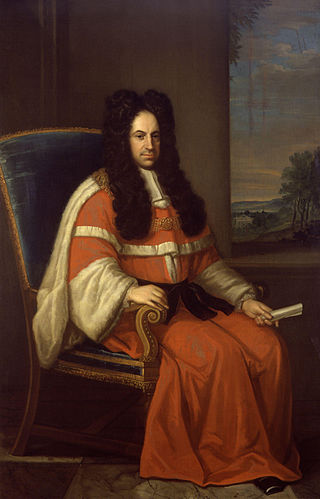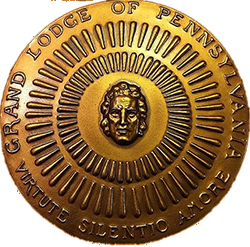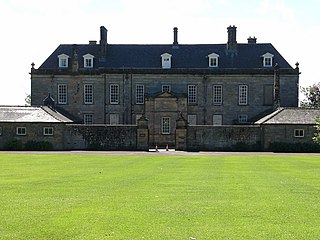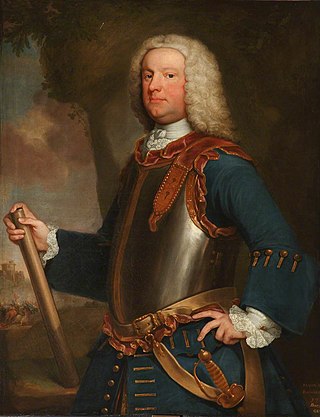Related Research Articles

Frederick, Prince of Wales was the eldest son and heir apparent of King George II of Great Britain. He grew estranged from his parents, King George and Queen Caroline. Frederick was the father of King George III.

Spencer Compton, 1st Earl of Wilmington, was a British Whig statesman who served continuously in government from 1715 until his death in 1743. He sat in the English and British House of Commons between 1698 and 1728, and was then raised to the peerage and sat in the House of Lords. He served as the prime minister of Great Britain from 1742 until his death in 1743. He is considered to have been Britain's second prime minister, after Robert Walpole, but worked closely with the Secretary of State, Lord Carteret, in order to secure the support of the various factions making up the government.

Marquess of Cholmondeley is a title in the Peerage of the United Kingdom. It was created in 1815 for George Cholmondeley, 4th Earl of Cholmondeley.

Earl of Onslow, of Onslow in the County of Shropshire and of Clandon Park in the County of Surrey is a title in the Peerage of the United Kingdom. It was created in 1801 for George Onslow, 4th Baron Onslow.

Peter King, 1st Baron King,, commonly referred to as Lord King, was an English lawyer and politician, who became Lord High Chancellor of Great Britain.

Samuel Ogle was the 16th, 18th and 20th Proprietary Governor of Maryland from 1731 to 1732, 1733 to 1742, and 1746/1747 to 1752.

The Grand Lodge of Pennsylvania, officially The Right Worshipful Grand Lodge of the Most Ancient and Honorable Fraternity of Free and Accepted Masons of Pennsylvania and Masonic Jurisdictions Thereunto Belonging, is the premier masonic organization in the Commonwealth of Pennsylvania. The Grand Lodge claims to be the oldest in the United States, and the third oldest in the world after England and Ireland, having been originally established as the Provincial Grand Lodge of Pennsylvania in 1731. This claim is disputed by both the Grand Lodge of Massachusetts and the Grand Lodge of Virginia.
Isaac Maddox was an Anglican clergyman, successively bishop of St Asaph and of Worcester.

Sir Walter Calverley Blackett, 2nd Baronet was a British baronet and politician who sat in the House of Commons from 1734 to 1777.
John Clavering of Chopwell Hall, Chopwell, formerly County Durham, now Tyne and Wear, was a member of a junior branch of the Clavering family.
The Charitable Corporation was an institution in Britain intended to provide loans at low interest to the deserving poor, including by large-scale pawnbroking. It was established by charter in 1707. Its full title was "Charitable Corporation for the relief of the industrious poor by assisting them with small sums upon pledges at legal interest". It became dishonest, and Smollett called it a "nefarious corporation". Certain of the directors speculated wildly and lost most of the shareholders' money.
Great Marlow, sometimes simply called Marlow, was a parliamentary borough in Buckinghamshire. It elected two Members of Parliament (MPs) to the House of Commons between 1301 and 1307, and again from 1624 until 1868, and then one member from 1868 until 1885, when the borough was abolished.

Sir Thomas Robinson, 1st Baronet (1703–1777), of Rokeby, Yorkshire, was an English politician who sat in the House of Commons from 1727 to 1734 and was a Governor of Barbados. He was an architect, collector and an extravagant character, whose life was the inspiration for numerous anecdotes.

Lieutenant-General Richard Onslow was a British Army officer and politician. After the death of their parents, his older brother Arthur bought him a captain's commission in the British Army. He first saw action in the Anglo-Spanish War in 1727, after which he was returned to Parliament for the family borough of Guildford. His political contributions were negligible in comparison to his brother, and he continued to serve as a career officer, holding commands in the War of the Austrian Succession at Dettingen and Fontenoy. In 1759, he was appointed Governor of Plymouth and commander of the Western District, and died as a lieutenant-general the following year while presiding over two prominent courts-martial.
The York Buildings Company was an English company in the late 17th and early 18th centuries.

Sir Archibald Grant, 2nd Baronet, of Monymusk, Aberdeen, was a company speculator and politician who sat in the House of Commons from 1722 to 1732. He was expelled from the House of Commons for his involvement in the frauds on the Charitable Corporation, and returned to Scotland where he devoted his time to improving his estate.
Sir Fisher Tench, 1st Baronet was a City of London financier, who was a Member of Parliament and a director of several companies.
John Thomson was warehousekeeper to the Charitable Corporation, but participated in a fraudulent scheme that deprived it of the bulk of its assets.

Dilston Castle is a ruined 15th-century tower house situated at Dilston, near Corbridge, Northumberland, England. It has scheduled monument and Grade I listed building protection.

Sir Charles Gounter Nicoll KB, of Racton, Sussex, was a British politician who sat in the House of Commons from 1729 to 1733.
References
- ↑ "No. 7034". The London Gazette . 26 October 1731. p. 2.
- ↑ Lowther Correspondence in Cumbria Record Office.
- ↑ John Mowbray, Report of the Gentlemen appointed by the General Court of the Charitable Corporation, 8.
- ↑ "Expulsions from the House of Commons" . Retrieved 1 February 2007.
- ↑ Robert Beatson, A Chronological Register of Both Houses of Parliament (London: Longman, Hurst, Res & Orme, 1807)
- ↑ "No. 7266". The London Gazette . 15 January 1733. p. 3.
- ↑ "No. 7231". The London Gazette . 15 September 1733. p. 2.
- ↑ London Gazette, passim.
- ↑ The statutes at large, from Magna Charta, to the thirtieth year of King George the Second, inclusive IV (ed. the late John Cay, Esq, London, 1758), 5 Geo. II, c.3.
- ↑ An abstract of all the acts passed in the sixth session of the seventh parliament of Great Britain, and in the sixth year ... of George II (London, 1733), 6 Geo II, c.2.